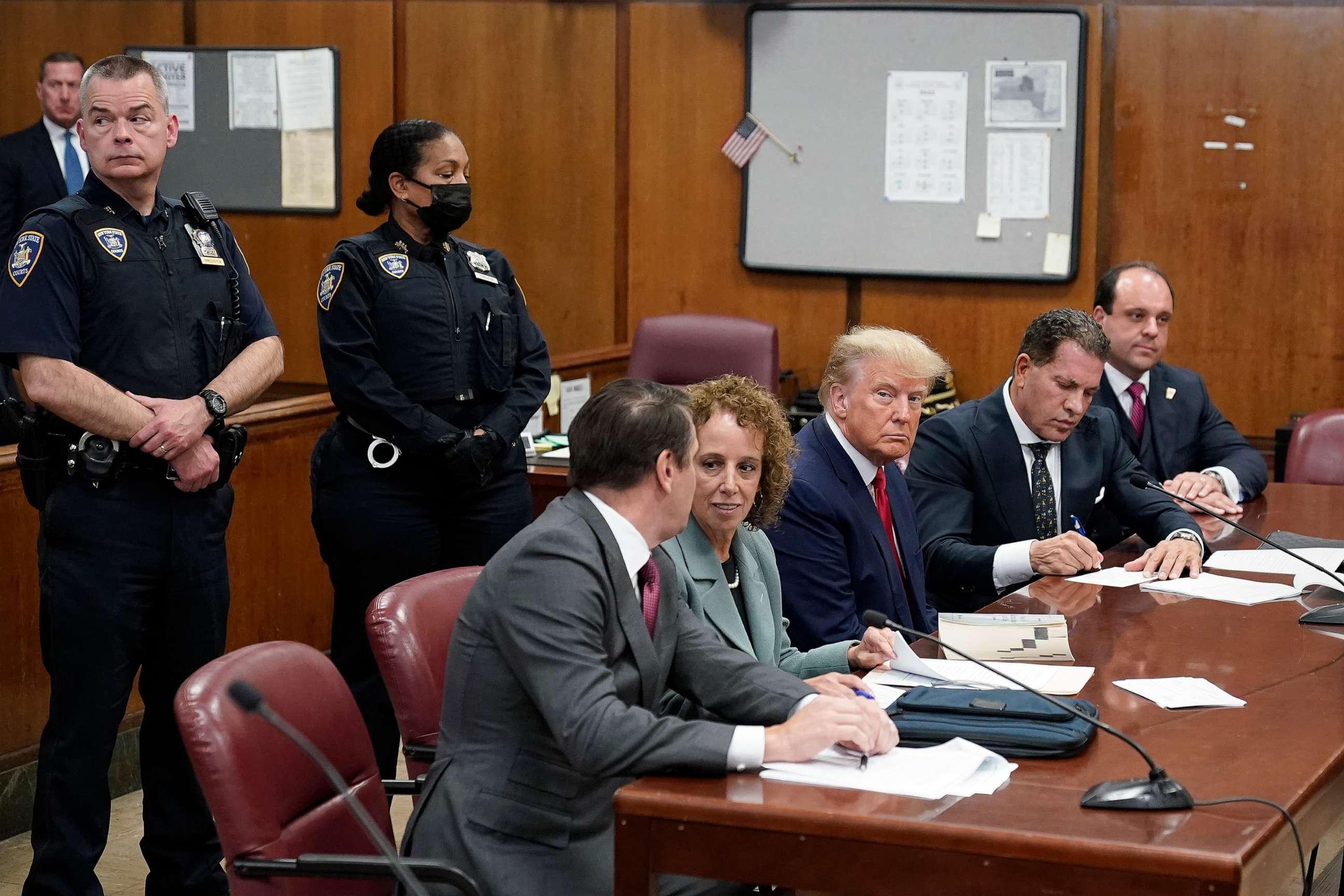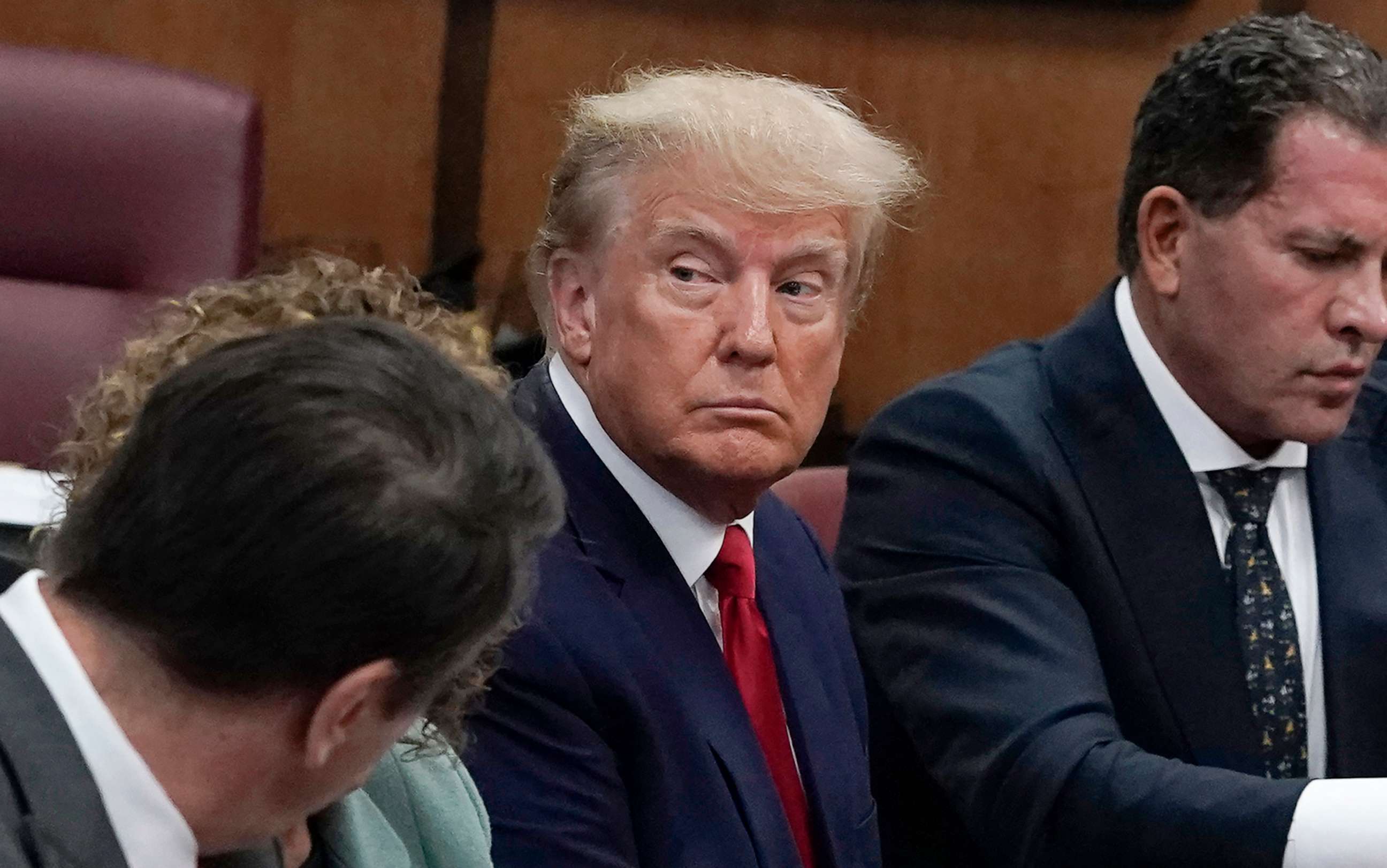Prosecutors detail Trump's alleged hush money 'scheme' to influence 2016 election
The former president entered a plea of not guilty to all charges.
Former President Donald Trump engaged in a "scheme" to boost his election chances during the 2016 presidential race through a series of hush money payments made by others to help his campaign, and then "repeatedly and fraudulently falsified New York business records" to conceal that criminal conduct, Manhattan prosecutors alleged as part of their charges against the former president Tuesday.
A "statement of facts" accompanying the 34-count indictment alleges that Trump discussed the scheme while he was in the Oval Office and made reimbursement payments to his lawyer for a year while he was in office.
Trump, who has denied all wrongdoing, entered a plea of not guilty to all 34 felony counts of falsifying business records related to one of those 2016 hush money payments.
Prosecutors said the efforts began in 2015 with an agreement with the CEO of National Enquirer publisher AMI to suppress damaging information, and included payments to two women who claimed to have had long-denied affairs with Trump, as well as a former Trump Tower doorman who claimed to have a story about a child Trump had out of wedlock that was untrue.
"From August 2015 to December 2017, the Defendant orchestrated a scheme with others to influence the 2016 presidential election by identifying and purchasing negative information about him to suppress its publication and benefit the Defendant's electoral prospects. In order to execute the unlawful scheme, the participants violated election laws and made and caused false entries in the business records of various entities in New York," prosecutors said in a statement of facts accompanying the charges.
"The participants also took steps that mischaracterized, for tax purposes, the true nature of the payments made in furtherance of the scheme," the statement said.
Prosecutors described a meeting at Trump Tower in August 2015, two months after Trump joined the presidential race, when Trump met with "Lawyer A" and the owner of the National Enquirer, in which the tabloid's owner "agreed to help with the Defendant's campaign, saying that he would act as the 'eyes and ears' for the campaign by looking out for negative stories about the Defendant and alerting Lawyer A before the stories were published. The [tabloid's owner] also agreed to publish negative stories about the Defendant's competitors for the election."

Prosecutors also said that after learning that a woman was alleging a sexual relationship with Trump while he was married, Trump was heard on an audio recording discussing how to pay for rights to the story in order to keep it silent. By then the owner of the National Enquirer had already paid $150,000 to the woman, but then Trump wanted to buy the rights to the story, prosecutors said. In around September 2016, Trump was caught on the recording saying: "So what do we got to pay for this? One fifty?" He also suggested paying by cash, according to prosecutors.
When his lawyer then disagreed, Trump mentioned paying by check. After the recorded conversation, Trump's lawyer created a shell company to help make the payment, prosecutors said. The reimbursement, however, did not ultimately happen.
In addition, prosecutors said that during Trump's transition into the White House, het met privately in Trump Tower with the National Enquirer's owner and thanked him "for handling the stories of the Doorman and Woman 1, and invited [him] to the Inauguration." Trump also invited the him to the White House for a dinner to "thank him for his help during the campaign," prosecutors said.
Additionally, prosecutors said that a Trump Tower doorman was trying to sell a story that he had heard that Trump had allegedly fathered a child out of wedlock. When the owner of the National Enquirer learned of this, his company "negotiated and signed an agreement to pay the Doorman $30,000 to acquire exclusive rights to the story." The company then "falsely characterized" this in its books. AMI ultimately determined that the story was false.
Prosecutors also said Trump falsified business records after Michael Cohen, Trump's former personal attorney, paid $130,000 to adult film actress Stormy Daniels in the closing days of the 2016 presidential campaign to keep her quiet about an affair she claimed to have had with Trump, which Trump has long denied.

Prosecutors said Trump illegally falsified business records when his reimbursement of the funds to Cohen was logged in the Trump Organization's books as a "monthly retainer" for Cohen's legal services.
"After winning the election, TRUMP reimbursed the Special Counsel through a series of monthly checks, first from the Donald J. Trump Revocable Trust -- created in New York to hold the Trump Organization's assets during TRUMP's presidency -- and later from TRUMP's bank account," Manhattan District Attorney Alvin Bragg said in a statement. "In total, 11 checks were issued for a phony purpose. Nine of those checks were signed by TRUMP. Each check was processed by the Trump Organization and illegally disguised as a payment for legal services rendered pursuant to a non-existent retainer agreement."
"In total, 34 false entries were made in New York business records to conceal the initial covert $130,000 payment," the statement said. "Further, participants in the scheme took steps that mischaracterized, for tax purposes, the true nature of the reimbursements."
Following the arraignment, Trump's attorneys said "there were no surprises" in the indictment and that they "plan to fight it hard."
Trump is "upset and frustrated and disappointed and mad that this happened," attorney Todd Blanche told reporters outside the Manhattan courthouse.
"While everyone is not above the law, no one's below it either," attorney Joe Tacopina said. "And if this man's name was not Donald J. Trump, there is no scenario we'd all be here today."
Trump, who is running for president again in 2024, was indicted on the charges on Thursday, becoming the first current or former U.S. president to be indicted for criminal conduct.




